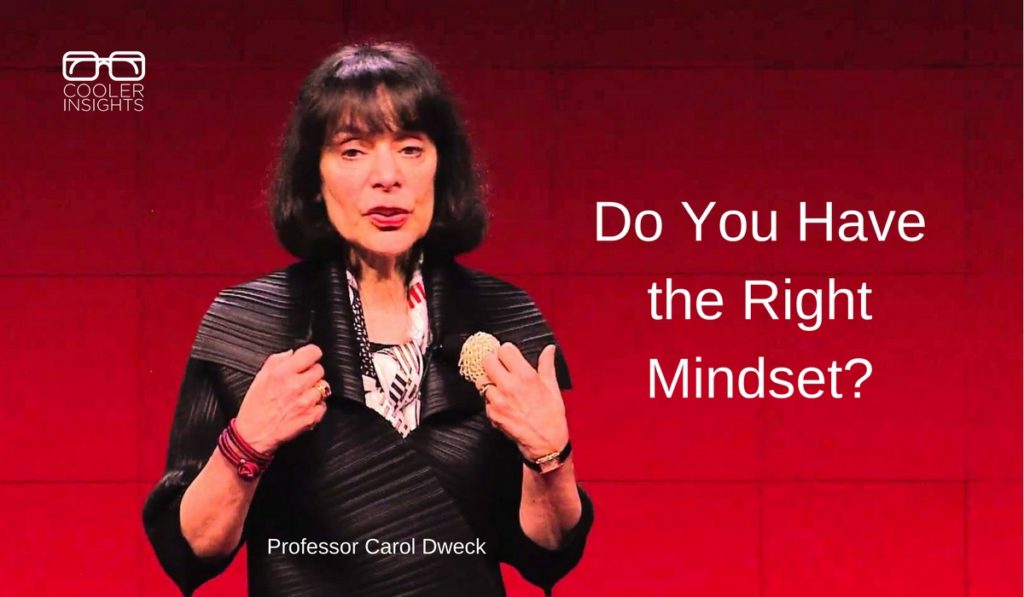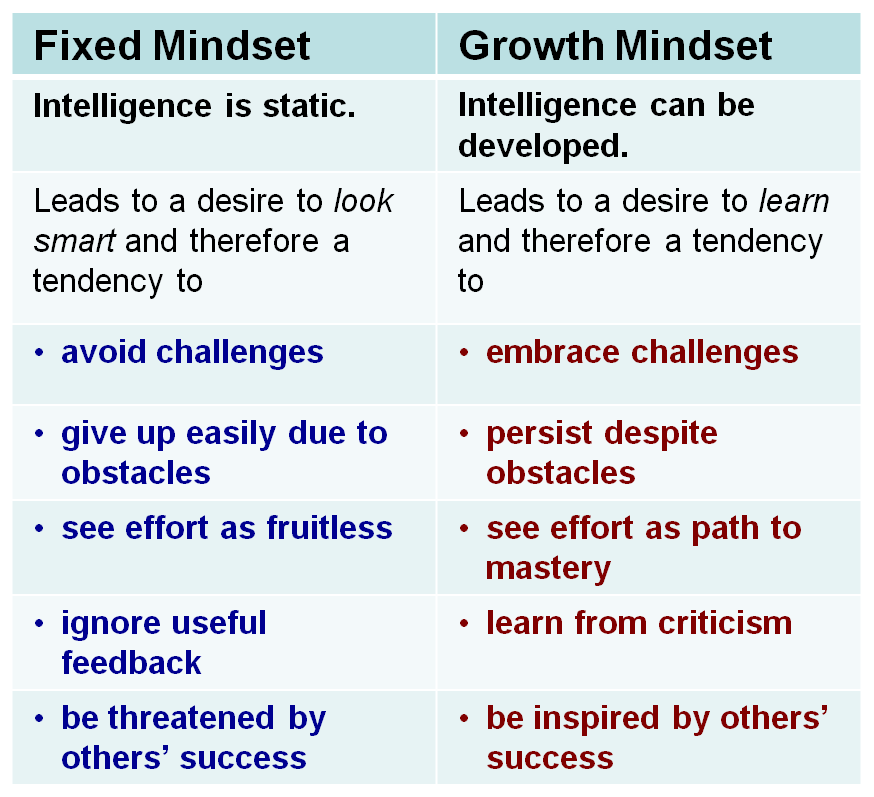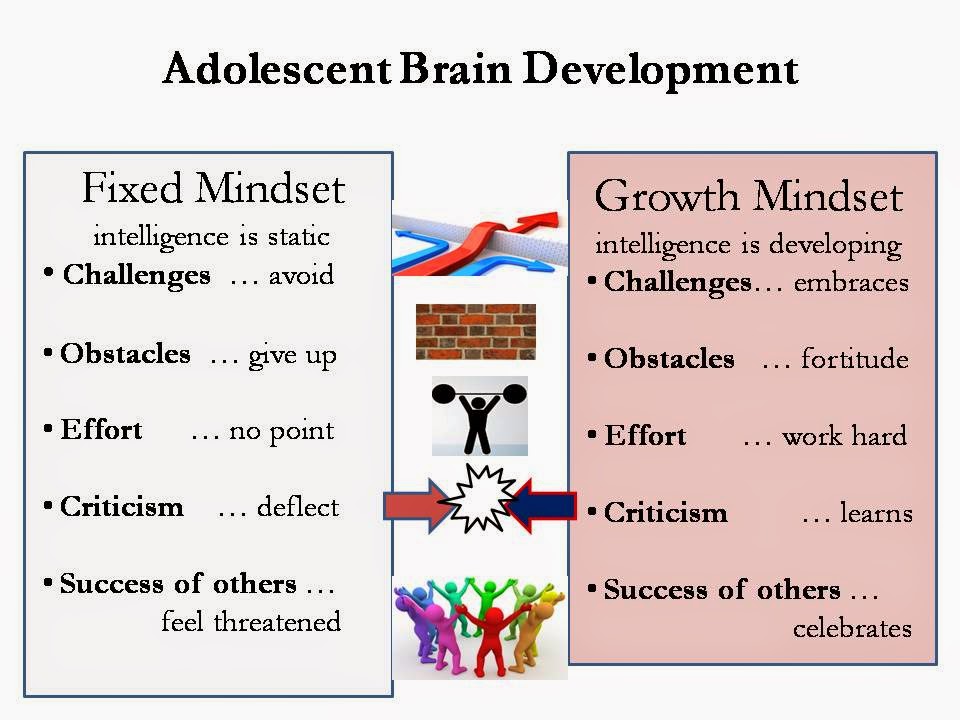
Courtesy of Standford Alumni YouTube
Why do some people perform amazingly well while others falter despite starting off at similar positions in life?
The difference, according to eminent Stanford psychologist Dr Carol Dweck, is in the mind. Or more accurately, your mindset.
Speaking at an episode of Knowledge for Men, Dr Dweck’s research demonstrated that success isn’t predicated on your intelligence or talent. Rather, it is embodied by how you perceive and cope with failures and setbacks.
This difference accounts for why kids who are academically on par may achieve vastly different outcomes in their eventual careers. Or why some folks can bounce back from failure to achieve glory while others flounder away.
How you view failure and success can be determined by whether you have a fixed mindset or a growth mindset.
Fixed Mindset
A person who adopts a fixed mindset believes that his basic qualities like intelligence, talent, creativity or skill are fixed traits. In other words, these attributes are either inherited as part of one’s gene pool or otherwise acquired from birth.
Due to the rigidity of their beliefs, folks with a fixed mindset spend their time documenting their intelligence or talent rather than develop them. They believe that you are either gifted or ungifted – that talent alone is the main determinant of success.
This drives their behaviour of playing not-to-lose rather than playing to win.
Growth Mindset
The flip side is the growth mindset. Those who believe this feels that their most basic abilities can be developed through dedication, grit, and sheer hard work.
While brains, talent and beauty may give you an initial advantage, folks in this camp practice life long learning, treating each difficulty as a necessary hurdle on the road to success.
With their expansive beliefs, folks with a growth mindset thrive on challenges and bounce back quickly from setbacks.
While it is normal for all human beings to be upset over failures, those with growth mindsets see them not as evidence of ineptness or stupidity, but “springboards for growth and for the stretching” of their abilities.
Fixed Mindset vs Growth Mindset
As these mindsets are manifested from a young and tender age, they often influence how we relate to success and failure in our professional, personal and social lives.
Interestingly, we may have a fixed mindset for one aspect of our life (say our work) yet adopt a growth mindset in another (say our hobbies).
A good way to compare the two can be seen in the table below.

Courtesy of Monday Morning Mojo
As you’d imagine, this boils down to what you may have experienced in your youth.
In her research with 10 year olds, Dr Dweck was inspired by how certain kids embraced challenges and were excited about being given the opportunity to solve a difficult project despite their youth. Unfortunately, their ability to view these challenges as opportunities for growth and learning was sadly lacking in most adults.
Growing from kids to adults, the developmental pathways of these youths will certainly impact how they view success and failure.
Students with growth mindsets remained active and engaged when they get depressed. They continued to groom themselves, get out of bed, and tackle problems head on.
Those with a fixed mindset, however, would let their school work go, withdraw from their social relationships, and opt to cut themselves off from the world when faced with failure.
The differences between the two can be neatly summarised by the five factors of mindset as show below: Challenges, Obstacles, Effort, Criticism, and Success.
Famous Examples of Fixed and Growth Mindsets
Historically, Winston Churchill and Thomas Edison were folks with growth mindsets. Both gentlemen faced tremendous odds with much aplomb, persevering through difficulties to eventually reach their career goals.
I’m sure everybody knewhow many times Edison failed before successfully inventing the light bulb (answer: about 10,000 times).
Elvis Presley and celebrity photographer Cindy Sherman also possessed growth mindsets. It was interesting to hear that Elvis wasn’t always a great singer – in fact his beginnings were fraught with failure.
On the other hand, Lee Iacocca, former head honcho of Chrysler, was cited as one with a fixed mindset. Preferring to bask in the limelight and glory at the pinnacle of his career, Iacocca was more concerned with the status and perks of his job as chairman and CEO. This resulted in the Japanese automakers eating Chrysler’s lunch.
What about Steve jobs? Well, Dweck felt that he was probably a mixture of both. While he was likely to have a growth mindset for himself as an innovator who never say die, he probably had a fixed mindset of others who failed to meet his standards.
Steps to Developing a Growth Mindset
OK, so our fixed mindsets needs to be “fixed” (pardon the pun). How exactly can we develop growth mindsets?
Dweck offered the following practical steps to reinventing your mindset:
1) Learn to hear your fixed mindset “voice”
When you approach a challenge, identify that negative inner voice. This isn’t difficult for many of us. The voice may take the shape of statements such as the following:
– “Are you sure you can do it? Maybe you don’t have the talent.”
– “What if you fail—you’ll be a failure”
– “People will laugh at you for thinking you had talent.”
– “This would have been a snap if you really had talent.”
– “You see, I told you it was a risk. Now see what you have done.”
2) Recognize that you have a choice
Next, realise that how you interpret challenges, setbacks, and criticism is your choice. You can either choose to belief that your intelligence, talents and abilities are limited (i.e. fixed mindset) or embrace a growth mindset and view them as signs that you need to increase your effort, sharpen your strategies and stretch yourself further.
3) Speak to yourself with a growth mindset voice
It is now time to turn the tables. Change the language in your mind. Twist an otherwise negative situation into a learning moment. Shift your voice from a fixed to a growth mindset.
Examples include the following:
– Instead of saying “Are you sure you can do it? Maybe you don’t have the talent”, say “I’m not sure I can do it now, but I think I can learn to with time and effort.”
– Instead of saying “If you don’t try, you can protect yourself and keep your dignity”, say “If I don’t try, I’ll automatically fail. Where’s the dignity in that?”
– Instead of saying “This would have been a snap if you really had talent”, say “That is so wrong. Basketball wasn’t easy for Michael Jordan and science wasn’t easy for Thomas Edison. They had a passion and put in tonnes of effort.”
4) Take the growth mindset action
Practice makes perfect. As you learn to hear both voices and to switch from a fixed mindset to a growth mindset, you need to practice acting on the growth mindset. View the world with the lenses of growth and take on challenges wholeheartedly.
Instead of viewing successful people with bitterness, view them as mentors whom you can learn from. Understand that you have a choice to learn from negative experiences and to embrace challenges as they swing by your way.
Stretch Your Mindset Today
As you can see, success is a life-long journey of both ups and downs. If we feel that we are stuck in a rut, we shouldn’t just stay where we are. Rather, we should discard our fixed mindsets of who we are and what we feel we are capable of, and put on the mantle of a growth mindset.
Finally, do you know that the inventor of the IQ test, Alfred Binet, didn’t design it to measure a child’s unchangeable intelligence? Rather, Binet created the test to identify kids who were not doing well in Paris public schools so that they can be brought back on track!
Quoting from Dweck’s website, here’s what Binet wrote in one of his books:
“A few modern philosopher’s assert that an individual’s intelligence is a fixed quantity, a quantity which cannot be increased. We must protest and react against this brutal pessimism…. With practice, training, and above all, method, we manage to increase our attention, our memory, our judgment and literally to become more intelligent than we were before.” – Alfred Binet
Ready to stretch yourself and embrace a growth mindset?


Not Everyone is able to get a successful mindset. But everyone should try this to become positive. A successful mindset never lets you down. Thanks for writing this.